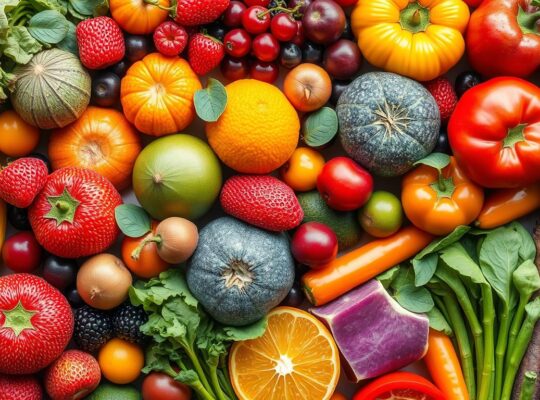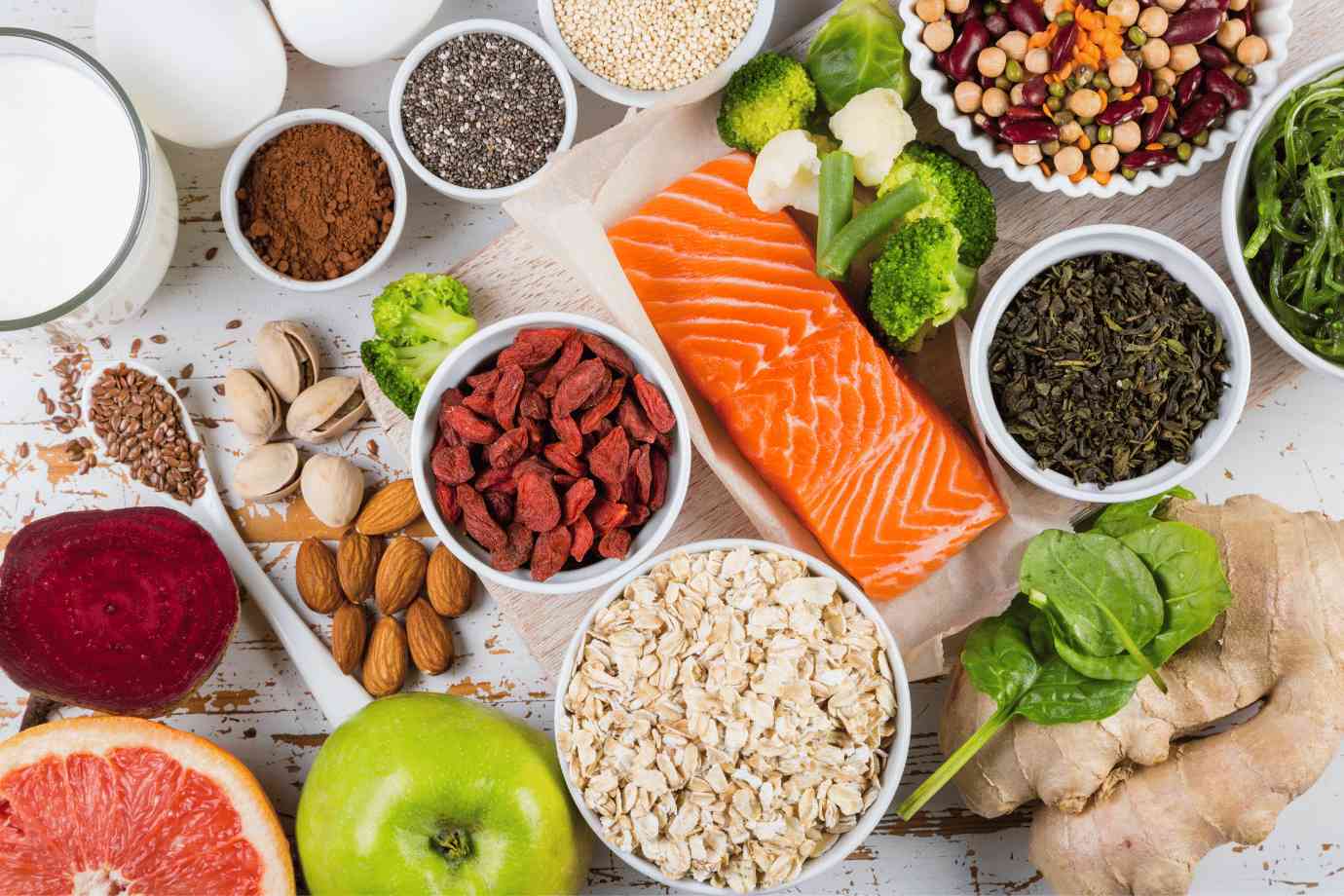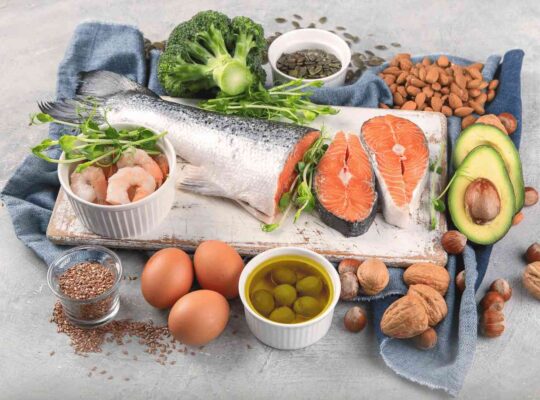Inflammation is your body’s natural way of protecting itself from harm, like infections or injuries. But when inflammation sticks around for too long, it can cause problems like heart disease, arthritis, and even diabetes. Luckily, eating the right foods can help reduce inflammation and keep your body healthy. In this article, we’ll talk about the top 10 superfoods for reducing inflammation. These foods are packed with nutrients that help lower inflammation and improve your overall health.
1. Fatty Fish
Examples: Salmon, mackerel, sardines
Key Nutrients: Omega-3 fatty acids (EPA and DHA), protein, vitamin D
Fatty fish like salmon, mackerel, and sardines are some of the best foods for fighting inflammation. They’re full of omega-3 fatty acids, which are special fats that reduce inflammation in your body. Omega-3s are also great for your heart and can even help with joint pain. Plus, these fish are a great source of vitamin D, which keeps your bones strong.
Incorporation Tips: Try to eat fatty fish 2-3 times a week. You can grill or bake salmon for dinner, or enjoy a sandwich with sardines for a quick lunch.
2. Berries
Examples: Blueberries, strawberries, raspberries
Key Nutrients: Antioxidants like anthocyanins, vitamins C and K, fiber
Berries are delicious and packed with antioxidants. These antioxidants, especially anthocyanins, help protect your cells and fight inflammation. Berries like blueberries, strawberries, and raspberries are also high in fiber, which helps with digestion and keeps you feeling full.
Incorporation Tips: Add berries to your morning smoothie, mix them with yogurt, or sprinkle them on oatmeal for a tasty, healthy boost.
3. Leafy Greens
Examples: Spinach, kale, collard greens
Key Nutrients: Vitamins A, C, K, folate, fiber
Leafy greens like spinach, kale, and collard greens are packed with vitamins and minerals that reduce inflammation and support overall health. These greens are rich in vitamins A, C, and K, all of which help keep your immune system strong and your body healthy.
Incorporation Tips: Toss leafy greens into a salad, blend them into a smoothie, or cook them as a side dish. You can also add them to soups or stews for extra nutrients.
4. Nuts and Seeds
Examples: Almonds, walnuts, chia seeds
Key Nutrients: Healthy fats (omega-3 and omega-6), fiber, protein, vitamin E
Nuts and seeds, such as almonds, walnuts, and chia seeds, are full of healthy fats like omega-3 and omega-6. These fats help lower inflammation and protect your heart. Nuts and seeds are also high in vitamin E, which is an antioxidant that keeps your cells healthy.
Incorporation Tips: Snack on a handful of almonds or walnuts, or add chia seeds to your cereal, salad, or yogurt for extra crunch and nutrition.
5. Olive Oil
Key Nutrients: Polyphenols, monounsaturated fats like oleic acid
Olive oil, especially extra virgin olive oil, is a healthy fat that fights inflammation. It’s rich in oleic acid, a monounsaturated fat, and polyphenols, which are antioxidants that protect your cells. Olive oil can help reduce your risk of chronic diseases like heart disease and diabetes.
Incorporation Tips: Use olive oil as a base for salad dressings, drizzle it over roasted veggies, or use it as a cooking oil.
6. Tomatoes
Key Nutrients: Lycopene, vitamin C, potassium
Tomatoes are rich in lycopene, an antioxidant that helps reduce inflammation, especially in the lungs and throughout your body. Lycopene also supports heart health, while the vitamin C and potassium in tomatoes keep your immune system strong.
Incorporation Tips: Add tomatoes to salads, use them in sauces, or enjoy them roasted as a tasty side dish. Cooking tomatoes makes the lycopene easier for your body to absorb, so tomato sauces and soups are especially good options.
7. Turmeric
Key Nutrients: Curcumin
Turmeric is a bright yellow spice that has been used for thousands of years as a natural remedy. The active ingredient in turmeric is curcumin, which has strong anti-inflammatory properties. It’s especially good for people with arthritis, as it helps reduce joint pain and inflammation.
Incorporation Tips: Add turmeric to curries, soups, or smoothies. You can also mix it with warm milk or tea. For best results, combine turmeric with black pepper, which helps your body absorb curcumin more easily.
8. Ginger
Key Nutrients: Gingerol
Ginger is another superfood with strong anti-inflammatory effects. Gingerol, the active compound in ginger, helps reduce inflammation and improve digestion. Ginger is great for people with stomach issues or inflammation-related pain.
Incorporation Tips: Use ginger in teas, stir-fries, soups, or even baked goods. Fresh or powdered ginger can add a zesty kick to your favorite dishes, and ginger tea can help calm nausea and digestive problems.
9. Green Tea
Key Nutrients: Catechins
Green tea is one of the healthiest drinks you can have. It’s packed with catechins, powerful antioxidants that help reduce inflammation and protect your cells from damage. Drinking green tea regularly can also help with weight loss and boost brain function.
Incorporation Tips: Enjoy green tea hot or iced. Drink a cup in the morning or afternoon to get a healthy dose of antioxidants.
10. Garlic
Key Nutrients: Allicin
Garlic doesn’t just add flavor to your meals—it’s also a powerful anti-inflammatory food. Allicin, a sulfur compound in garlic, helps reduce inflammation and boost your immune system. Garlic has been shown to lower the risk of heart disease and improve overall health.
Incorporation Tips: Add garlic to your cooking for extra flavor and health benefits. It’s perfect in soups, sauces, stir-fries, or roasted on its own.
Conclusion
These top 10 superfoods for reducing inflammation are not only tasty, but they also help your body fight off inflammation and stay healthy. By adding a variety of these foods to your diet, you can lower your risk of chronic diseases, improve your heart health, and reduce pain caused by inflammation. So next time you’re planning your meals, think about including some of these superfoods like fatty fish, berries, leafy greens, and olive oil. Your body will thank you!
FAQs
- Can I reduce inflammation just by eating these superfoods?
While these superfoods help lower inflammation, it’s important to also live a healthy lifestyle that includes regular exercise, enough sleep, and managing stress. - How often should I eat fatty fish to reduce inflammation?
It’s recommended to eat fatty fish, like salmon or sardines, 2-3 times a week for the best anti-inflammatory effects. - Do I need to eat all 10 superfoods every day?
No, you don’t need to eat all of them every day. Try to include a mix of these foods throughout the week for a balanced, inflammation-fighting diet. - Can green tea really help with inflammation?
Yes! Green tea contains antioxidants called catechins that help reduce inflammation and protect your body from cell damage. - Why is garlic good for inflammation?
Garlic contains a compound called allicin, which has been shown to reduce inflammation and boost your immune system. - How can I add turmeric to my diet?
You can easily add turmeric to your meals by using it in curries, soups, or smoothies. Combining it with black pepper helps your body absorb the curcumin better.









